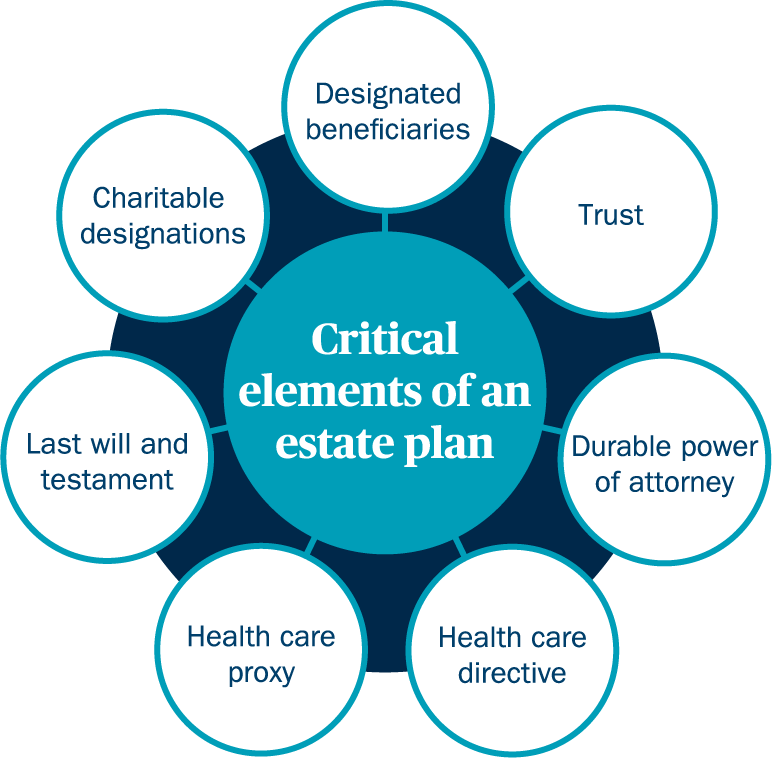Learn the fundamentals of estate planning and how it can benefit your legacy and loved ones.
An estate plan is vital to leaving the legacy you want. It allows you to provide for the people, organizations or causes you care about after you’re gone — while also providing peace of mind for yourself and your loved ones now.
Yet, it may seem intimidating to those just starting to think about estate planning.
It doesn’t have to be. Along with your estate attorney and tax professional, we will help you create an estate planning strategy that reflects your financial priorities and values.
Here is an introduction to the fundamentals of estate planning — and how it can benefit you.
In this article:
What is an estate plan?
Estate planning is the process of mapping out how your property and assets will be distributed in the event of your death. An effective estate plan typically addresses who will inherit your assets and often includes a detailed plan for end-of-life health care decisions, should you become incapable of making these decisions yourself. It also seeks to minimize the tax burden for those who inherit your assets.
Benefits of estate planning
A thoughtful estate plan goes beyond deciding who gets what. Here are some of the most important estate planning benefits:
- Clarity: An estate plan creates clear directions for distributing your property and assets upon your death — exactly as you wish — and allows you to name people to oversee that process, such as an executor or trustee. If you have minor children or other dependents, an estate plan allows you to name a guardian in the event of your passing.
- Medical guidance: If you’re not able to make decisions for yourself, an estate plan can outline your health care wishes and name someone to make financial and medical decisions on your behalf.
- Flexibility: An estate plan gives you options to support the people, charitable organizations and causes you care about most during your lifetime and after you’re gone.
- Saves money and time — and ensures privacy: Without an estate plan, a court in your state of residence will determine how to distribute your assets after you die. This public, court-supervised process is known as probate. It is a time-consuming process that often results in higher costs and taxes for your heirs and loved ones. An estate plan can also provide tax mitigation benefits to help pass on as much of your estate as possible.
- Peace of mind: An estate plan gives your loved ones a clear understanding of your precise wishes during a difficult time.
Learn more: Getting started on estate planning: Key actions to take
Fundamentals of an estate plan

Most estate plans include several basic elements, though yours may include more advanced tools and strategies depending on your family situation as well as the size and complexity of your estate.
Here are the most critical elements of an estate plan:
Creating an estate planning team

Estate planning is usually a team effort, involving you, your family, my team and other professionals. Here are the key figures involved:
- Financial advisor
- Estate attorney
- Tax advisor
- Durable power of attorney
- Medical power of attorney
- Executor
- Trustee
Learn more: How to choose an estate planning team: Attorneys, trustees, and executors
How often should I update my estate plan?
Like your financial plan, it's important to review your will and other estate planning documents regularly — or when significant life events occur, at the minimum. While there isn’t a one-size-fits-all approach, review your estate plan after major life events or every 3 to 5 years.
Significant life events may include:
The best time to start planning is now
We will work with you and your estate planning team to guide you through the process, evaluate your specific needs and create a strategy that makes sense for you, your loved ones and your values.